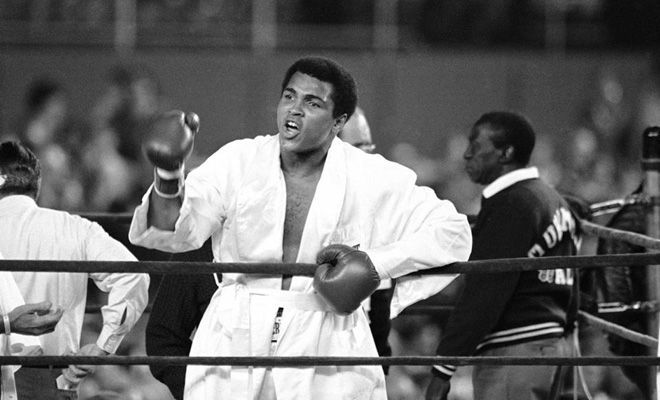Canada and USA
In His New Book, Muhammad Ali Biographer Thomas Hauser Pays Tribute to “The Greatest”

Thomas Hauser Pays Tribute – “The intellectual heavyweight of all boxing writers is the incomparable Thomas Hauser,” wrote Mike Gallego in a 2012 article in Deadspin. And, he may have added, Hauser sure is prolific. The frequent TSS contributor has authored and co-authored so many books, fiction and non-fiction, that the exact number is a little hazy. A good round number would be “50,” half of which relate to boxing. The latest addition to his portfolio, Muhammad Ali: A Tribute to the Greatest, was released just last week by Pegasus Books.
Hauser, needless to say, is familiar with the subject. He spent two years researching and writing Muhammad Ali: His Life and Times, published in 1991. The research entailed combing through reams of archival material and interviewing about 200 people. As Ali’s official biographer, Hauser had unlimited access to the man himself. Following the publication they teamed up on a book tour that brought them to England, the cradle of pugilism, where Ali is even more exalted than he is in his native country.
Muhammad Ali: His Life and Times was nominated for a Pulitzer Prize, a National Book Award, and won the William Hill Sports Literary Prize, an award that carries considerable cachet in England. Literally dozens of books centered on Muhammad Ali have been written in the intervening 25 years, but the Hauser book is still referenced as the definitive Ali biography.
Hauser’s latest book follows the template of the Hauser boxing books published annually by the University of Arkansas Press. Those books are largely compendiums of previously published materials. The timeline is the connective tissue: most of the stories are about events that transpired within the previous calendar year. Here the connective tissue is Muhammad Ali, the man who would leave a larger footprint than any athlete the world has ever known.
Those familiar with Hauser know that he is less concerned with what happens inside the ropes than with humanizing the various role-players that make the events happen, most obviously the prizefighters but also others who are part of the machinery. Boxing to Hauser is less an athletic competition than a component of popular culture. Drawing a true portrait of Muhammad Ali, warts and all, was a daunting assignment – “The Greatest” was a bundle of contradictions – but Hauser managed to pull it off.
Hauser’s new book contains everything that he has written about Muhammad Ali since his 1991 opus. Some of the pieces were previously published in his 2004 book The Lost Legacy of Muhammad Ali. The final chapter of the new book, The Long Sad Goodbye, is brand new, but the overarching theme is one that Hauser has addressed before – the commercialization of Muhammad Ali. After Ali lit the torch at the 1996 Atlanta Olympics, he was embraced by corporate America which then sanitized him, blotting out that which made him such a controversial figure in his younger days. As Ali lost the ability to speak, notes Hauser, words were attributed to him that he would have never used. To which we would add (and Hauser would concur) that sentiments were attributed to him that may not have reflected his true feelings.
There are 27 chapters in the book. One of the longest, and Hauser’s personal favorite, is titled Elvis and Ali. Muhammad Ali had two legacies – as an athlete and as a moral force – Elvis only one, as an entertainer, but yet the parallels between them are striking.
Born seven years apart in the segregated South, Elvis and Ali exploded on the scene and became global superstars. When they were young, says Hauser, each had a rhythm that was all his own. Both were remarkably good-looking, both had natural gifts that made them great showmen and both became counterculture symbols — polarizing figures who agitated the white establishment, albeit for different reasons and then, with the passage of time, were no longer threatening. The big difference between them was the way in which they handled their enormous fame. Ali embraced it; for Elvis it was burdensome, it destroyed him.
Hauser doesn’t absolve Elvis from the bad decisions that ruined his health, but neither does he question Elvis’s musical genius or look down upon the white working-class culture that spawned him. Indeed, he appreciates Elvis’s contribution to the great American export called rock-n-roll. This stands in welcome contrast to the first big biography of Elvis, Albert Goldman’s execrable Elvis.
Muhammad Ali’s physical decline spanned three decades. Young people today don’t remember Ali when he was larger than life or understand what forces propelled him into this orbit. They recognize Ali as a person who was famous for being famous. “Future generations may well see Ali more clearly than young people do now,” says Hauser.
Many more books will be written about Muhammad Ali; you can count on it. The foundation for many of these books will be found in the works of Thomas Hauser.
Muhammad Ali: A Tribute to the Greatest is available through Amazon and other leading book-sellers. The book is available in hardback and kindle editions.
Thomas Hauser Pays Tribute
-

 Featured Articles4 weeks ago
Featured Articles4 weeks agoResults and Recaps from New York Where Taylor Edged Serrano Once Again
-

 Featured Articles2 weeks ago
Featured Articles2 weeks agoThe Hauser Report: Zayas-Garcia, Pacquiao, Usyk, and the NYSAC
-

 Featured Articles5 days ago
Featured Articles5 days agoOscar Duarte and Regis Prograis Prevail on an Action-Packed Fight Card in Chicago
-

 Featured Articles4 weeks ago
Featured Articles4 weeks agoResults and Recaps from NYC where Hamzah Sheeraz was Spectacular
-

 Featured Articles3 weeks ago
Featured Articles3 weeks agoManny Pacquiao and Mario Barrios Fight to a Draw; Fundora stops Tim Tszyu
-

 Featured Articles4 weeks ago
Featured Articles4 weeks agoPhiladelphia Welterweight Gil Turner, a Phenom, Now Rests in an Unmarked Grave
-

 Featured Articles2 weeks ago
Featured Articles2 weeks agoArne’s Almanac: Pacquiao-Barrios Redux
-

 Featured Articles1 week ago
Featured Articles1 week agoRemembering Dwight Muhammad Qawi (1953-2025) and his Triumphant Return to Prison





















